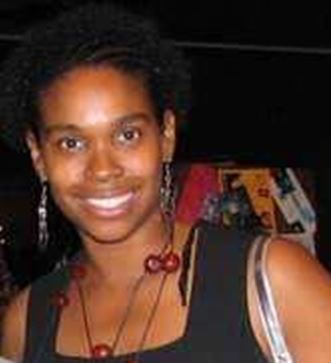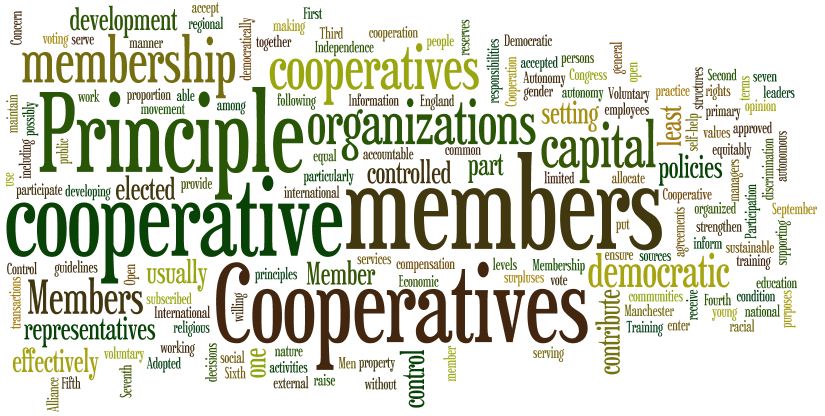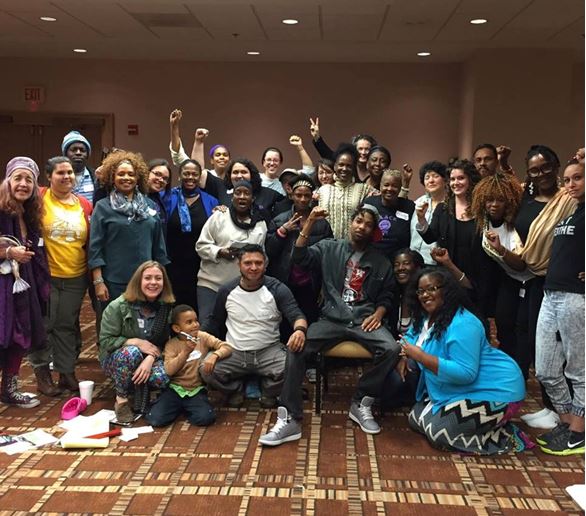PARABLE OF THE SOWER INTENTIONAL COMMUNITY COOPERATIVE

From Self-Defense to Self-Determination
By Sam Allen 2nd November 2017 Culture & Society
Parable of the Sower Intentional Community Cooperative.
This is the fourth blog from guest editor Kate Duva of Prosocial Power.
A conversation with Aleta Alston-Touré is not a conversation
about one woman. It’s a conversation about a movement – a vast chorus of
thousands of people who are fighting and loving their way to collective
liberation.
Aleta, a popular education artist, mother, and community
organizer for human rights, was working on community and juvenile
justice campaigns in Jacksonville, Florida when, in 2012, she got a call
from the mother of Marissa Alexander. Alexander, a mother of three
young children, was sentenced to 20 years in prison for firing a single
shot into the wall as a warning to her estranged husband, who was
threatening to kill her. In the battle with Florida state’s attorney
Angela Corey – the same official of notorious cruelty who failed to
convict George Zimmerman for killing unarmed 17-year-old Trayvon Martin –
Aleta and her comrades raised $100,000 for Marissa’s legal funds, and
mobilized over 37,000 supporters nationwide.
Thanks to these many organizers, Marissa Alexander is now a
free woman, and Angela Corey has been ousted from public office. The
movement continues to reverberate, reaching far beyond one woman’s fate –
it has revolutionized the lives of countless people who learned how to
organize for social change during Marissa’s landmark court case.
In September 2017, nine months after Marissa Alexander’s release, I had
the pleasure of talking with Aleta Alston-Touré about the many
generations of organizing that have been accomplished by her, her
comrades, and their ancestors, and the fruits that these labors are
coming to bear – most remarkably, Parable of the Sower, the first black
women-led intentional housing community in modern history. Aside from a
few explanations in italics, all of these words belong to Aleta and the
movement of which she is part. May you be as agitated, inspired, and
illuminated as I have been by our conversation.
These are the words of Aleta Alston-Touré.
Free Marissa Now
I had quit my job doing the National Children’s Study with the National Institute of Health (NIH). I had also worked on an eight million dollar grant for Jacksonville Systems of Care. They were bringing in black women to work with them and paying them 35 or 40 dollar meeting stipends for their time. They were supposed to make families more in charge, and of course, who became in charge instead? The police department, institutions, and non-profits. It was a system of wrap-around services that became exactly like the systems that were faulty – a poverty pimping system.
That’s when I left NIH and started The New Jim Crow Movement – a grassroots organization with a nonprofit fiscal agent, the Southern Movement Alliance, to dismantle the cradle-to-prison pipeline. We were doing political education, youth and community organizing, and campaigns for juvenile justice, and all these parents were asking, ‘Man I need your help, you know how to do this.’ Then I got a call from Marissa Alexander’s mother.
Marissa Alexander, a young black mother of three, was confronted in her home by her estranged, abusive husband just nine days after giving birth to her youngest child. He assaulted her, attempted to strangle her, and threatened to kill her. She fired a single shot into the wall as a warning. Florida’s ‘Stand Your Ground’ law was supposed to give domestic abuse survivors the right to defend themselves – but Florida state’s attorney Angela Corey made a case against Marissa, and she was sentenced to 20 years in prison – which Corey later sought to triple to 60 years.
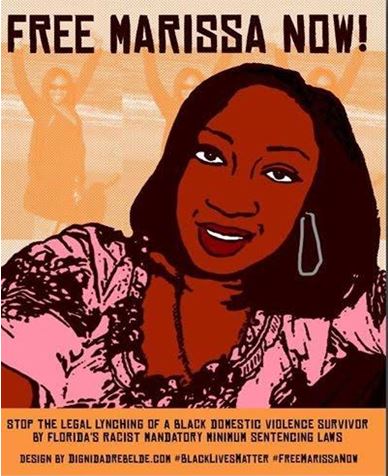
These are the words of Aleta Alston-Touré.
Free Marissa Now
I had quit my job doing the National Children’s Study with the National Institute of Health (NIH). I had also worked on an eight million dollar grant for Jacksonville Systems of Care. They were bringing in black women to work with them and paying them 35 or 40 dollar meeting stipends for their time. They were supposed to make families more in charge, and of course, who became in charge instead? The police department, institutions, and non-profits. It was a system of wrap-around services that became exactly like the systems that were faulty – a poverty pimping system.
That’s when I left NIH and started The New Jim Crow Movement – a grassroots organization with a nonprofit fiscal agent, the Southern Movement Alliance, to dismantle the cradle-to-prison pipeline. We were doing political education, youth and community organizing, and campaigns for juvenile justice, and all these parents were asking, ‘Man I need your help, you know how to do this.’ Then I got a call from Marissa Alexander’s mother.
Marissa Alexander, a young black mother of three, was confronted in her home by her estranged, abusive husband just nine days after giving birth to her youngest child. He assaulted her, attempted to strangle her, and threatened to kill her. She fired a single shot into the wall as a warning. Florida’s ‘Stand Your Ground’ law was supposed to give domestic abuse survivors the right to defend themselves – but Florida state’s attorney Angela Corey made a case against Marissa, and she was sentenced to 20 years in prison – which Corey later sought to triple to 60 years.
We already knew who District Attorney Angela Corey was. We had already battled her. We saw the statistics – the number of black and brown people she put away, including black women. We knew her from the Cristian Fernandez case – he was only 12, the youngest boy ever to be incarcerated with adults.
Free Marissa Now turned out to be our biggest organizing campaign. It became national, and then international, in a way that the 20 people, then 200 people that first started with us could not imagine, with 37,000 members. We partnered with African-American/Black Women’s Cultural Alliance out of Washington, D.C. and Radical Women. We led it together, when it got too big to do alone – putting up the Facebook page, mailing list, and Google documents, and then it got bigger than all three of us. Then we were joined by INCITE!, an LGBTQ transformational collective out of California, who put up the website.
We did domestic violence work, so if you were part of the Free Marissa Now community, we would give a toolkit to dozens of chapters in different states, and they would all publicize it with social media, put it in the newspaper, and do a national day for domestic violence. Across the nation, there were birthday parties for Marissa, club nights in New York where every dollar raised went towards the cause, a table in Harlem where people signed petitions in the rain and the snow, coffee shops raising money in Colorado. The many mechanisms of what we did – and still do – showed how organized we are as a movement.
We had to make it national, because no one saw what was really happening on the ground on the news in the antebellum south of the Confederacy, which is where Jacksonville is. Angela Corey bullied the local news. She would tell the papers, ‘don’t put that article out, slice out whatever [organizers to free Marissa] said.’ So we went outside of Jacksonville, to Miami, to Florida, and we found out the state was in cahoots – Angela Corey had been threatening people to comply.
We had to go to talk with the national NAACP [National Association for the Advancement of Colored People] and SCLC [Southern Christian Leadership Conference], because both the local chapters had not been able to discuss this patriarchal pushback – how most men could walk with us for justice for Trayvon Martin, but not for Marissa Alexander.
Same with the Florida domestic violence shelters: Angela Corey threatened them that they would lose their non-profit funding and shut down if they supported Marissa. So the domestic violence shelters supported Rico Gray, her estranged husband, because the police report said he was the victim – even though we pushed other women to tell their stories, and later seven other women testified that he was abusive. And the white women directors and board did not try to work with us until late in the campaign, when we had built a lot of pressure. That money from the non-profit industrial complex is sometimes evil, when the very women who should have been protected, loved and supported are seen as not showing “genuine fear,” as the judge said about Marissa. As black women, we are seen as “too strong.” I’ve been there.
As a state prosecutor, Angela Corey was supposed to be on our side – the side of the people. We got calls and e-mails from people in her office at night, saying ‘We want to help you, but we can’t tell you who we are, she’ll retaliate against us.’ People were trying to help us because they knew how evil she was. They knew she was one of the governor’s best friends – she wasn’t doing this on her own. Any news coverage that we were getting, they were able to squash it, so we had to make it national. Eventually we were able to get The New York Times, Al Jazeera America, Democracy Now!, The Nation, Amsterdam News, and the BBC to ask us, ‘How can we help?’
When Corey let George Zimmerman go for killing Trayvon Martin, we did a dignity walk, from Jacksonville, Florida, where Marissa is from, to Sanford, where Trayvon was killed. Soon after, Marissa was granted a new trial.
Thanks to the Free Marissa Now movement, and the
support of over a dozen attorneys and legal organizations, Marissa
Alexander’s sentence was capped at the three years she had already been
in prison, plus two years of house arrest. She was finally released from
house arrest on January 27, 2017.
See Aleta talking to Amy Goodman about the March for Dignity in 2013 on Democracy Now!
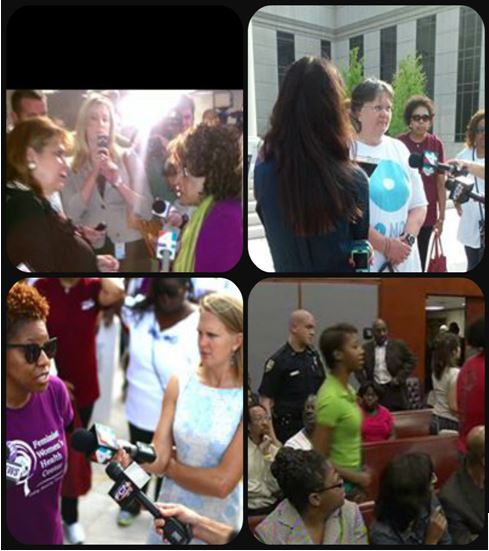
“So many were birthed out of this movement”
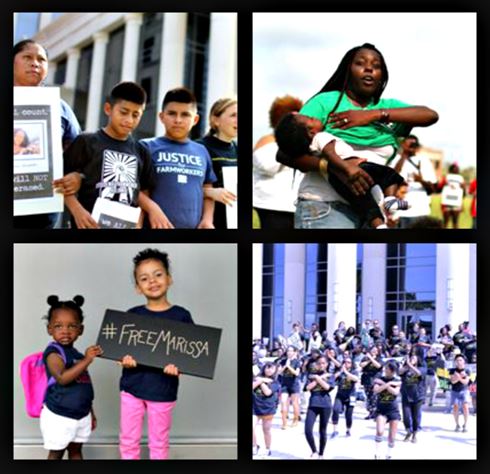
In December of 2014, Aleta and 18 other organizers were arrested for a Black Lives Matter protest against police violence on Hart Bridge in Jacksonville, Florida. They became known as The Jacksonville 19.
This was one action – but it wasn’t. The cops said we were fine to be released, because we were going off the ramp of the highway, but then they turned around and arrested us for obstruction of traffic. Angela Corey had found out via phone what we were doing, and she wanted to get us, as backlash to the many campaigns and demonstrations we did for juvenile justice, for Cristian Fernandez, for Trayvon Martin, and Jordan Davis [who was murdered by a white man for playing loud music], for being in the courts, for being on NPR. She wanted to get us, so she locked us up in the basement of the Jacksonville jail.
The police were apologizing: ‘It’s not us! It’s Angela Corey, she told us to hold you here.’ We had handcuffs on, and we were sitting in police cars in the basement under the jail for hours. We weren’t even booked, we didn’t even get fingerprinted. She just held us there.
Our other organizers were looking for us, and they couldn’t find us. They thought they were trying to kill us! They told us all about it later – how all of a sudden, the TV station helicopters were outside, and our organizers were out there making noise, saying, ‘Look, they’ve got hostages in the basement!’
DA Angela Corey tried to do anything she could to convict us, but she couldn’t. We were protestors. We had a restitution we had to pay to the state of Florida, we had community service hours, we had court dates. They split our court cases up, so we couldn’t fight back together.
The Duval County Court system made a mockery of our movement. The judge laughed at me – ‘Ha ha ha! Black Lives Matter!’ [in a mocking voice]. ‘Not All Lives Matter?’ He looked like a cartoon character.
I replied, ‘We have shown in every aspect of America All Lives Matter, we are saying Black Lives Matter also. There I was, defending myself for being an organizer – and schooling the judge on cultural competency, similar to trials in the 60’s.
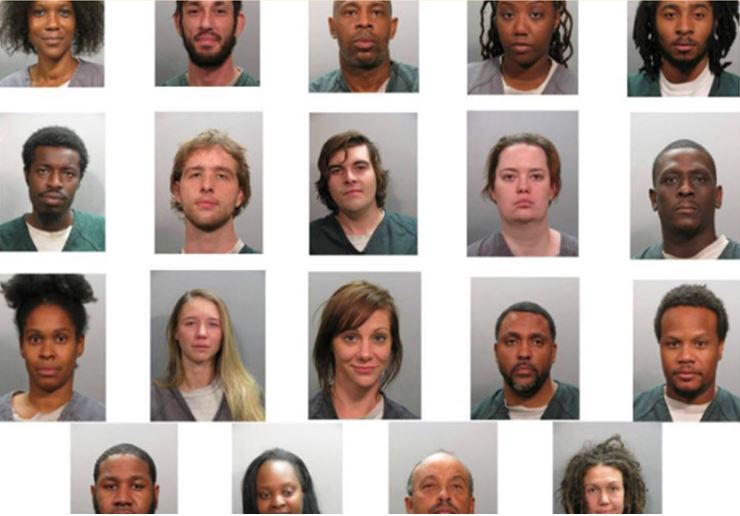
See Aleta talking to Amy Goodman about the March for Dignity in 2013 on Democracy Now!

“So many were birthed out of this movement”

In December of 2014, Aleta and 18 other organizers were arrested for a Black Lives Matter protest against police violence on Hart Bridge in Jacksonville, Florida. They became known as The Jacksonville 19.
This was one action – but it wasn’t. The cops said we were fine to be released, because we were going off the ramp of the highway, but then they turned around and arrested us for obstruction of traffic. Angela Corey had found out via phone what we were doing, and she wanted to get us, as backlash to the many campaigns and demonstrations we did for juvenile justice, for Cristian Fernandez, for Trayvon Martin, and Jordan Davis [who was murdered by a white man for playing loud music], for being in the courts, for being on NPR. She wanted to get us, so she locked us up in the basement of the Jacksonville jail.
The police were apologizing: ‘It’s not us! It’s Angela Corey, she told us to hold you here.’ We had handcuffs on, and we were sitting in police cars in the basement under the jail for hours. We weren’t even booked, we didn’t even get fingerprinted. She just held us there.
Our other organizers were looking for us, and they couldn’t find us. They thought they were trying to kill us! They told us all about it later – how all of a sudden, the TV station helicopters were outside, and our organizers were out there making noise, saying, ‘Look, they’ve got hostages in the basement!’
DA Angela Corey tried to do anything she could to convict us, but she couldn’t. We were protestors. We had a restitution we had to pay to the state of Florida, we had community service hours, we had court dates. They split our court cases up, so we couldn’t fight back together.
The Duval County Court system made a mockery of our movement. The judge laughed at me – ‘Ha ha ha! Black Lives Matter!’ [in a mocking voice]. ‘Not All Lives Matter?’ He looked like a cartoon character.
I replied, ‘We have shown in every aspect of America All Lives Matter, we are saying Black Lives Matter also. There I was, defending myself for being an organizer – and schooling the judge on cultural competency, similar to trials in the 60’s.

So many organizers and activists were birthed out of this movement. People saw our mugshots on TV, and we looked like terrorists, the way they portrayed us. They had one big picture with our 19 mugshots, and they put it on TV sometimes 5 times a day. People lost their jobs because of that. A lot of us lost housing. I opened my house as a safe house for some people to come, because they couldn’t go back to their families. Some people’s families wouldn’t talk to them because they were on TV every day, looking like terrorists, not organizers. But we were going to find a way to be resilient, and self-sufficient.
By this time, Aleta and her co-strugglers had already received international attention for their work exposing Angela Corey and other Florida officials who used ‘Stand Your Ground’ self-defense laws selectively – disproportionately punishing people of color, and setting white people free. In March of 2014, they traveled to the UN, to give testimony to the Washington, D.C. chapter of the Inter-American Commission on Human Rights.
Going to the human rights hearing at the United Nations was kickass. We were stronger together than apart. I spoke for Marissa, Trayvon Martin’s mother spoke for him, the father of Jordan Davis, who was shot 8 times for playing loud music, spoke, the Dream Defenders who took over the governor’s office spoke, and the ACLU [American Civil Liberties Union] and NAACP spoke about why standing your ground in Florida has to be reckoned with.
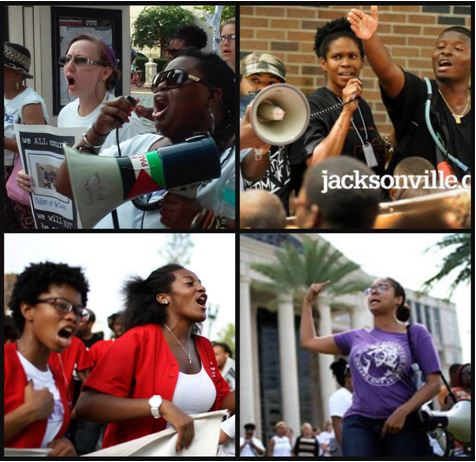
So many organizers and activists were birthed out of this movement. People saw our mugshots on TV, and we looked like terrorists, the way they portrayed us. They had one big picture with our 19 mugshots, and they put it on TV sometimes 5 times a day. People lost their jobs because of that. A lot of us lost housing. I opened my house as a safe house for some people to come, because they couldn’t go back to their families. Some people’s families wouldn’t talk to them because they were on TV every day, looking like terrorists, not organizers. But we were going to find a way to be resilient, and self-sufficient.
By this time, Aleta and her co-strugglers had already received international attention for their work exposing Angela Corey and other Florida officials who used ‘Stand Your Ground’ self-defense laws selectively – disproportionately punishing people of color, and setting white people free. In March of 2014, they traveled to the UN, to give testimony to the Washington, D.C. chapter of the Inter-American Commission on Human Rights.
Going to the human rights hearing at the United Nations was kickass. We were stronger together than apart. I spoke for Marissa, Trayvon Martin’s mother spoke for him, the father of Jordan Davis, who was shot 8 times for playing loud music, spoke, the Dream Defenders who took over the governor’s office spoke, and the ACLU [American Civil Liberties Union] and NAACP spoke about why standing your ground in Florida has to be reckoned with.
The application of Stand Your Ground routinely fails to value the defense of black life. The reason given for why Ms. Alexander was not granted Stand Your Ground immunity is that the judge decided she did not feel genuine fear. This is absurd, but not surprising, because research shows that courts often don't perceive black women victims as sympathetic and credible. Instead black women are characterized as aggressive, emasculating and incapable of being victimised.We have been pushed out, over-policed and under protected.* Instead of supporting Ms. Alexander as a victim of violence, the state's attorney ultimately reinforced the domestic violence she experienced by punishing her for saving her own life. Black women, and all women have the right to self defense. (Taken from Aleta Alston-Touré's speech to the UN)
*Kimberlé Williams Crenshaw, renowned scholar on intersectionality, took inspiration from the movement in naming her report with the African American Policy Forum, Black Girls Matter: Pushed Out, Overpoliced and Underprotected.
From Being on the Defense to Getting in Front of the Ball: The People’s Movement Assembly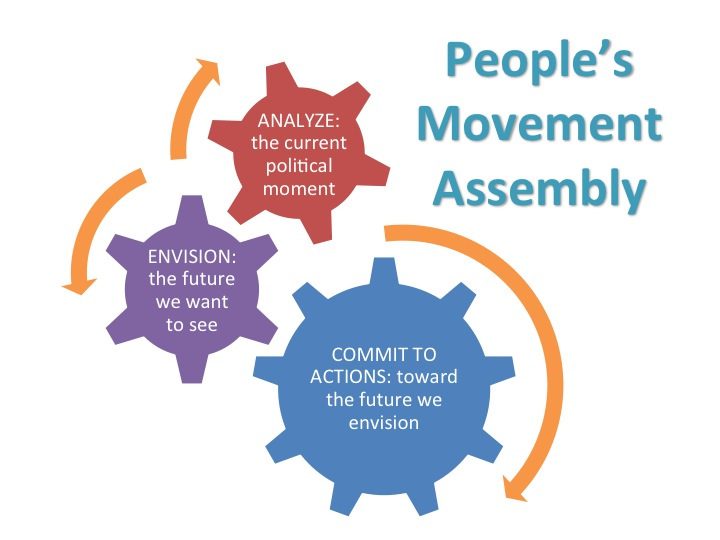
We decided to use a process called the People’s Movement Assembly, and we did it the day after Marissa Alexander was released from court, which was actually the same day they gave me a trial, too, for being in the Jacksonville 19. Here we were, licking our wounds, saying ok, we just had all this happen to us yesterday – we had been kicked out of the courtroom, people had to sit in the courtroom lobby, it was unconstitutional, so our lawyers had to come, the court system purposely put my court date the same day as Marissa’s… all kinds of things happened.
All these organizers drove in from California, Miami, Chicago, North Carolina, New York… and we sat down and used this People’s Movement Assembly framework, from the World and US Social Forum. We said, ‘After what happened yesterday – we were pushed out, overpoliced and underprotected – what do we want? What would we like to see happen next? It’s not just about Marissa Alexander anymore, the one person, it’s about the movement.’ The People’s Movement Assembly process is very thorough. It takes the whole day for this democratic process. We came up with 30 to 40 resolutions for our next work, and a black women-centered intentional community was one of them.
That, to me, was a turning point. We came up as organizers, as activists, as mothers, as youth, as organizations for liberation and social change, and we had this idea to create a new economy after winning this battle. Sustainable organizing works – but we don’t always want to be on the defense. We don’t want to just be in the streets, and in the courts – we want to get further in front of the ball, to be much more strategic.
We joined The New Economy Coalition along with our Southern Movement Alliance because we are gearing higher than just organizing on the street, freeing people from prison and police brutality. We are envisioning for the seventh generation. That is what the dream of intentional community said to us, and that’s what this country is saying right now, especially since November 2016.
From Poverty Pimping to Actualizing Our Humanity
I started organizing around housing 30 years ago. A lot of the sisters in our cooperative have been in HUD [public housing] properties, have been homeless, have lost housing with their families or partners because of their organizing. In moving this work to free Marissa, we found out that a lot of women didn’t care to sometimes not have a place to live, or not have childcare. They would bring their kids to the courthouse, the library or wherever, and just do this work, because they are already pitted against. What does it look like when someone makes sacrifices like that? Most people would say it looks like a third world country. I have been homeless too.
I left a cushy Obama job through the National Institute of Health to come back and do this organizing. But of course, I still had to make decisions as a single mother to survive and have a good life for my children. I believe being an organizer can be even harder for black women, because the biggest thing for my family, or any family that comes out of the south, was ‘Make your goals in life, we are not in slavery anymore, we can get to these meccas and get good jobs, get through the glass ceiling’ – you know, the ‘Pull yourself up by your bootstraps’ thing – even as black women with children. But the truth of the matter is, we were always contending with oppression that still followed us, whether we were in the middle class with a federal job, or out organizing on the streets, or with a non-profit, or having to choose one aspect of our intersectionality, as LGBTQ women.
Our vision is having our own destiny, making our way in a new pattern of how workers can live. We’ve been poverty pimped – ‘You are labor. Work in your lane to make the machine run smoother.’ Our stories and our numbers have been essential for the nonprofit industrial complex. A HUD property needs us so they can get more grant money. You don’t see enough women leaving HUD properties to buy their own homes. They lean more on the system – once you’re in a HUD property, you get food stamps, once you’re on food stamps, you get all these free things, and it makes it hard for women to get outside of that poverty pimping realm where they get their own garden, go out and buy properties – or, as a lot of women who were working with Marissa ended up doing – become organizers, become lawyers, and go on to help others in a collective way. It’s always ‘be a part of our system, let us take care of you.’ But we are educating these women on their importance to the movement.
Parable of the Sower: Bringing the Visionary Work of Octavia Butler to Life

From the original cover illustration of Octavia Butler’s Parable of the Sower, by John Jude Palencar
Aleta is one of 10 members who is bringing a black-women led worker cooperative and intentional community to life. There are over a hundred people on the waiting list, and the collective has received support from around the country, including land donation offers from multiple foundations and communities. Thanks to a suggestion from Aleta’s daughter YaYa, the community was named Parable of the Sower, after the 1993 novel by trailblazing black science fiction writer Octavia Butler. Butler’s story of a young woman who brings a collective together to forge their own destiny depicts America’s near future as a time of rampant inequality and brute violence – a vision that is terrifyingly close to our present day reality.
All that you touch You Change.Octavia E. Butler - Parable of the Sower
All that you change Changes You.
The only lasting truth is change.
Of the two thousand intentional communities that are recognized in the world, we will be the first for black women. Actually, I think we’ll also be the first [modern recognized intentional community] led by people of color, and the first led by women. So we are pioneers on the frontier of the New Economy for envisioning something that may have been talked about forever, but has not been supported.
This is a pilot that will support the next intentional communities that we will build for black women, women of color, and eventually others. There are four sections, or villages. We’re looking into easily made homes – tiny homes, or adobe houses, pre-fab, some trailers while we build. We have cooperative members in construction, so we’re looking at a lot of options. Sustainable may mean we try out different formats, and find out what’s best.
The first village is for women and children. That could also include beloved partners, or grandparents. The second village is more elderly and disabled individuals, and will be set up to give those members ways to meet their needs, through support from the rest of us, who will all work 35 hours a week. The third village is where we’ll get a lot of our income, from a central retreat space, and cabins around it. We’ll also get income from the fourth village, where you’ll see the organizing component, with interns coming out to stay for our organizing campaigns, and legal support – it will be almost like a dorm, with space to camp out, too, and a concert venue.
And then we’ll have our farm, our organic vegetable garden, our goats, our chickens and our bees. So some of our work will be selling our wares at a farmer’s market on Saturday. And we’ll have a collective kitchen and collective daycare.
We are developing our cooperative using proven models. We’re getting a lot of support from the Fellowship for Intentional Community. We did a workshop at their annual conference, at Twin Oaks Community in Virginia. And we use these cooperative guidelines that I really love called The Madison Principles, to make sure that we are clear of conflicts of interest, and holding our bylaws to the highest level of ethics.
The Worker-Owned Cooperative
One of our main worker-owned business projects for income is doing training for what we call BTA – Black Trauma Anonymous. We’ve done BTA sessions to respond to killings and trauma in black communities, and we’ve already had requests to go out and do them nationally. We want to reach cities that haven’t even been enrolled by Black Lives Matter. We’ll find church venues where people can start their own decentralized groups, like NA [Narcotics Anonymous] or AA [Alcoholics Anonymous], without the need for health insurance or therapists – creating circles that allow people to come together in the same way that made AA an international model. We are going to work on publications, and finding free spaces in communities, like AA does, to support these groups that are inconspicuous and self-governed.
Another worker-owned business project is Black Life Alert. Can you picture a lady with headphones on, saying ‘Let me connect you now’? We want to be a 24-hour support system just like that, for our emergencies. We’re designing an alert system for families of color. The system will connect people in need to our local supports, which we already have in almost every state.
And for our educational work, our consulting component, which comes from our organizing backgrounds, we’ll be going out to do trainings. The trainings will be on organizing, especially with women with children, mobilization campaigns, orientations for Black Life Alert or BTA. Everyone will have 35-40 hours a week of work to do – less for the elders, and the children. There will be tending to the goats and chickens, making sure the garden is up to par, preparing the retreat center, helping with the security system, repairing the houses and toilets. We’ll have daycare, the community kitchen, a space for political education for people from the community to come have classes, and we’ll have food that’s innately us – green tomatoes, snap peas, sweet potatoes, collard greens! We want to help Hip Hop expand to stop our community food deserts.
This coming month, we’re putting out the call to the 37,000 people who were involved in Free Marissa Now, and beyond. We’re opening things up in August 2018 for people to RSVP to come for a whole month and have the opportunity to help us build our pilot community in Mississippi.
Mississippi might not be the last place we arrive. We’re still looking for the perfect land. But we decided to pilot there because of our camaraderie with [renowned solidarity economy network] Cooperation Jackson, and the leadership of the new mayor Chokwe Antar Lumumba.
We’ve had lots of land donated to us – land in Florida, land in Virginia, land in Tennessee – but as prestigious as the institutions are that donated the land, these places may not be safe for black women. We’re picking this land in Mississippi because it’s predominantly black, and Jackson is a city of black liberation leaders.
The Land Corps: A Peace Corps for the 21st Century
There’s such a terror in our country right now. Black people are scared of this man in the White House. I don’t say his name. He’s already putting plans in place to get rid of a lot of housing. This regime is in place to destroy all the work of liberation and the Civil Rights Movement, and by that I mean the human rights movement, as well. But we are ready. We are building, and we’re combating that fear with love. We can see our society being so close to the terrible times that Octavia Butler’s book revealed, and we live that notion of Beloved Community as mentioned by Martin Luther King.
We’ve just got to be diligent and make sure this comes through, and what better way to do this than to have this Land Corps in August of 2018, where organizations will come through, just as so many did during the Free Marissa years – organizations, and individuals, artists, mothers, and men against patriarchy… we want them all! We want them to fill up the villages with tents, and help build the housing for families, the playground and cabins and retreat center. Just as when a group builds a new church, they have other churches come to help them – we’re going to do that for this one month. People can see what it’s like to live intentionally while actually doing it.
And that will allow us to have meetings at night to see who else is interested in being on the waiting list, and after this pilot, after two years, where will we go next? Where will the next intentional community be for black women like us? We have said maybe five would be our max, but some of our members have pointed out that we have allies, women of color, even allies who aren’t women of color, who would love to live like this as well. Using this model with our own families, that would help us to go out and do training and pave the way for more women to have our own housing, where we’re not struggling to pay rent to a landlord.
We call this the Land Corps, because it’s going back to the land. A lot of people went into the Peace Corps outside of this country. But we’ve always felt like there was a war right here in America. Not that we shouldn’t go to other countries, but why are we going to these other countries when there is so much to take care of in the war that has been hell for organizers right here?
We were in fear for our lives during Marissa Alexander’s trial. But now is not where we go into fear. This is where we go into higher synergy – into action. And not just the urgency of rapid response, like we have had, because of deaths by police brutality, but urgency to the next places for climate justice, and racial justice. This is the new future. And this is the new economy.
From Intentional Community back to Asusuma: Reclaiming Global Legacies of Cooperation
Our elder Chokwe Lumumba dedicated his life to discuss with us the importance of Land. His legacy is why we are so committed to Cooperation Jackson, and why the election of his son, Mayor Chokwe Antar Lumumba was so important. We have to work with our children to win this rat race by bringing legislation and law practices that stand for Black Liberation.
Learning from Native American cultures and going to the sun dances has also been an important part of my background. My mentor was Ernie Stevens, Sr., who was a leader in the American Indian Movement. He was Oneida. Ernie showed me their booklet about planning for the next seven generations. They knew how they were going to do it, from one generation to the seventh generation. Our self-determination is attached to the freedom of both our people. As black people, we have to be reminded of the Black Liberation Movement since slavery – there is a strong reparations movement.
We want people to know that these words union, intentional community, community land trust, and cohousing are new, compared to other words that have been around for centuries. They’re new in comparison to our ancestral heritage, the ways that worked for us before we came to this country – ways of oppressed people, especially in those countries of the African diaspora.
In Africa there are asusumas – when people cannot find work, they find work to do together in a cooperative. La sociedad is how we would say it in South America. The Boa Morte is a women’s collective in Brazil – they’ve been doing collective housing for ages. They were the African slaves who built the state of Bahia. And then there’s the palenques, caves in Cuba where African slaves organized, and the thousands of quilombos throughout Brazil, where slaves became self-governing. Accompang Village, or Maroon Village, is a village in Jamaica that fought off the British, and they’re still there. They still own that territory. And the Gullah/Geechee here in the American South are still fighting for their land control.
Before this country existed, there were ways that we lived and fortified our work together. We have to look outside of America to find the roots of how African people lived. This is why our global perspective is so important. We’re leaving the slave tradition of how we’ve had housing, and incorporating this international perspective that says we can build anew – even here.
My great-grandfather, Sterling Alston, built 10 houses for his 10 children. Our homestead is still in North Carolina, despite the fact that all the elders have passed, and we as Africans in America haven’t seen the value of the Southern Land yet. Many African-American families that migrated from the South have a love/hate story like mine. The land will bring us back.
Sitting at the Feet of Our Elders and Passing the Torch: The Urgency of Intergenerational Dialogue
Parable of the Sower is a call not just to BLM, Black Lives Matter – it is also a call to the other BLM, the Black Liberation Movement! We are in the midst of trying to foster more dialogue between these two movements. I’m a part of both generations. My mom was part of the Black Liberation Movement, and I’m considered to those elders as a young person. And a lot of Black Lives Matter organizers consider me to be an elder! So where am I? I’m still in the fight.
I support bringing them together, intergenerationally, and I see Parable of the Sower being able to do that. When we were in Africa, before slavery, the elders had the warriors in the movement sit at their feet. When they went out to war, when they did anything politically, they were able to take the teachings of their elders into consideration. Our Black Liberation Movement has not always been able to have Black Lives Matter at their feet, learning from them. I know what that looks like, because I was at their feet. I’m still the child of that movement. And Black Lives Matter is saying to the Black Liberation Movement, we need you to understand that the patriarchy, and LGBTQ ignorance, have to be dealt with. The baton has to be passed to the women, our queer and trans forces, and our youth.
I’m not just talking about the Black Panthers, I’m talking about our many liberation movements, the maroon villages, the Womanist movement, the Pan-African movement, even non-profits that came out of movements. We are trying to get them connected to this next generation, so that our youth won’t make the same mistakes as in the past. Everything that’s happening now has already been happening in history. And we find the People’s Assembly process our asset to bring a democratic process between these groups.
Beyond Psychedelic Colors and Bubbles: Real Talk with Allies
How dare we dream? It’s one thing to have a non-profit, community center, black college or a school, but to have our own housing, our own land… how dare we? That’s what we’ve been told. We have an urgent need for resources and allies, for our safety. Rosewood, and Black Wall Street [prosperous black towns that faced violent attacks in history] were proof that we need our allies. We need investment, and we need people to say ‘We back you in your self-determination’ – the same backing that we see across the country in window signs of allies that spell BLACK LIVES MATTER.
We will offer the Land Corps building time in August 2018 as a residency for people to come to Parable of the Sower. We want allies, black, white, people from other countries, to come stay on the land for a month, and we will be working together every day during that month. Anyone who comes to visit will fill out an application, and we’ll go through a process. We won’t be discriminating, but for security reasons, we need to know, ‘Who is this person?’
We want people to see how we can use land in this country, and build other spots. We support the self-determination of people everywhere, not just us – intentional communities that are black, white, and mixed.
But historically, mixed communities haven’t retained black people. Here in the Bay Area [in northern California], the turnover for black lesbians when they’re offered cohousing rooms is so dramatic, it should be outlawed. Now there’s a high rate of homeless black lesbians and trans people here, in this place that was known as the first sanctuary for gay rights in this country. We ask people why they’ve left, and they say it’s hard – ‘There’s always a sense that we are a member of the community – but we’re not always a member, when it comes to housing.’
A lot of white so-called allies believe that black people can’t govern themselves: I’ve been told, ‘You all are struggling so much that we’ve got to do it for you.’ But there’s that thing, ‘Oh, I’m not racist, so I’m not going to say that.’ That’s a whole other level that we need allies to dialogue about – undoing whiteness, just as we undo our own internalized racial oppression. Our 37,000 members are not all black. They’re white, they’re Asian, but they’re people who have been honest with this level of dialogue – ‘We’re doing work, we’re taking out fires, and oppression – but we’re also working against it in ourselves.’
In the Bay Area, there is a place where people don’t want to talk about black resistance. The Black Lives Matter and Black Panthers movements are not cherished here like they should be. Some folks are doing anti-racism work alongside us, like Catalyst and SURJ – but some folks are so defensive. So many blacks and whites say, We can get along! We all love each other. Someone once told me, We had the summer of love – drugs and sex brought us to a different level! It’s like a big melting pot of psychedelic colors and bubbles.
What is Political Education? Love, Love, Love & then Revolutionary Love
One of the most important parts of resistance is political education – which is also revolutionary love. There is a stigma against the Black Panthers and Black Lives Matter because they are seen as angry and rageful. I’m here to say that any movement is still based in love for the people – and our rage is validated in these 400 years of oppression, white supremacy and imperialism.
Right now, there are people being killed in other countries, and we’re ludicrous to think it’s not happening here. It has always happened here. People are dying here, we’re just not paying attention to this war. That’s why we have to support studies like Operation Ghetto Storm, with the Malcolm X Grassroots Movement, so folks can stop saying we are all getting along in the psychedelic colors and bubbles of Kumbaya. I think of monks who helped resistance movements in Italy, France and Ireland. Those things are talked of internationally, but not enough here in this country – even though the movement work here is crucial, especially during these times that feel apocalyptic.
Revolutionary love means that we are always at ease – but ready to defend. As human rights organizers and activists, we’re not using violence, but we understand why our movement armies have in the past. It’s like the example of a mother and child – a mother will do anything to protect her child. [People say] ‘I would never hurt anyone,’ but you get in a situation where your child is being hurt – well, you tell me afterwards what happened. You get in action mode. That’s not being violent, that’s resistance from years of oppression. In the Bible, there were also wars. Now we fight so many of our battles in courts that are intentionally disregarding the law, or using deliberate indifference, in the words of Edgar Cahn.
Political education is the most important thing, because if people are not organized – that’s the key, if they’re not organized and they’re wanting to be a part of things and create change – they’ll go another way. When I worked with gang members, I would truly get to that part of love. ‘We family. We about taking care of each other.’ And then, once you do that, build them up, you can break it down. Each one teach one.
We need more political education in how to fight for our humanity. Organizers new and old must find next steps from visibility in the streets, and we need more social work with every job we do. There are people who say they hate going into welfare offices, even when they rightly need it, and it’s because of how they’re talked down to. They make you feel inhuman. So many teachers do that, and doctors and nurses and court officers – all these structures that we pay for do this to people, whereas they should be treated out of love.
I used to be a teacher, and I’ve seen so many people go into a classroom and say, ‘That’s the bad child.’ I don’t see any child as bad. I have never seen a bad child. I can relate to any child that’s considered bad, and the reason is, he comes from somewhere. Something made him that way. If you find the softness in him, get to what his struggle in life is, and bring it out, he can be such a beautiful light.
We need to teach political education classes on being human, on how to talk to people. Cultural Competency, and Linguistics. That’s what I believe organizers are doing – we are a strong force to be reckoned with, and when we see systems listening, then we can bring humanness to people when they are enraged. We understand their rage is justified, but we also have to bring them back to the softness and the humanness of this movement – and to fight as a movement – not as individuals.
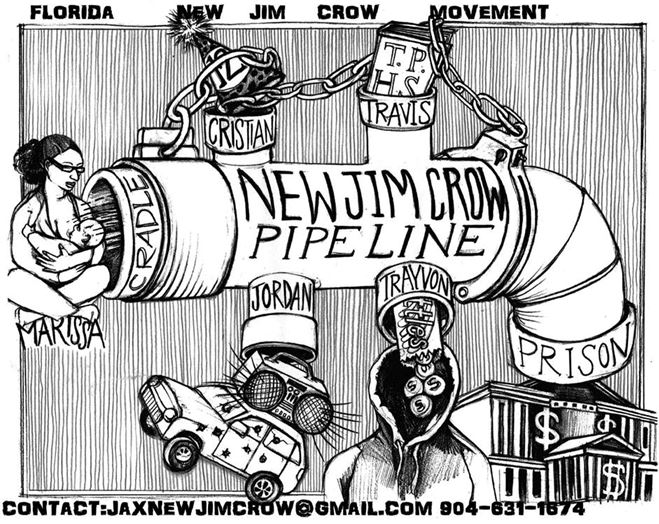
Dismantling the cradle-to-prison pipeline: The New Jim Crow Movement logo.
Transmuting Trauma: The Role of Healer Responders in the Movement
We now have members who take on the role of healer responders at some forums, and outside venues. While we do our actions at meetings, people cry, or get emotions they didn’t know they had, and we bring them to a healing space. We push all this stuff inside ourselves and keep walking – rape, sexual abuse, police terror, especially for some of the lesbian and trans women. Some people get trapped. They can’t move. All kinds of things can happen when you don’t deal with trauma in your body, so we give people the space to do that.
The healer responders here in Vallejo [California] are acupuncturists, chakra healers, massage therapists, Reiki healers. We use ecstatic dance, breath work, womb healing, herbalism and tinctures and medicinal food… And now, whenever we do this movement work, we make sure to have healers present. We have plans to open up the doors at our cooperative and other spaces monthly for this. We’ve introduced this to the community – we charged 20 dollars, and you could go to all of the healers.
And BTA, Black Trauma Anonymous, is part of this work as well. It is decentralized purposely, to eventually reach all 50 states, where people can meet at a community center or church, and just share intimately, anonymously.
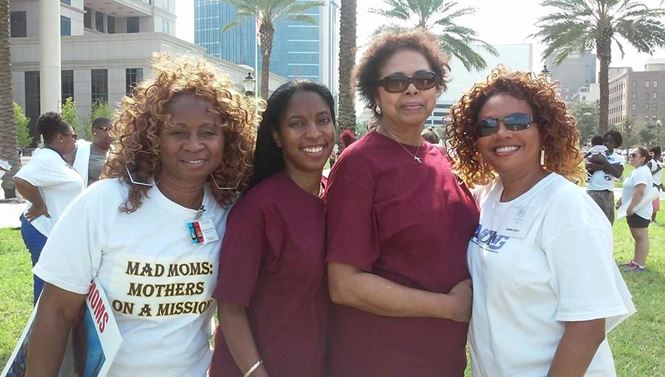
Dr. E. Faye Williams, president of NCBW (National Congress of Black Women) joins organizers for the Standing Our Ground Week of Action
How Dare We Dream?
Why is society so fearful of our vision? Why is society so fearful of us being in charge of our own destiny? There’s even pushback from other black women groups who are skeptical of this freedom. This is the sad part. People knew of our work. They knew of our organizing, and our raising $100,000, and working with lawyers and public officials across the country to get Marissa Alexander free – but in our process of putting together our bylaws and our proposal for Parable of the Sower, when we started telling people about our visions – envisioning a life without food stamps, without having to rely on housing and HUD and these white male supremacist systems to survive – be they federal, or state, or nonprofit systems – when we talk about being in charge of our own destiny, we still get this ‘How dare you? How dare you think you can live without these resources? How dare you dream so big?’
Well, we’re doing it. All of us in this cooperative, and the 37,000 people who found the human side, by connecting to Marissa – we are worthy of living our lives sustainably, outside the system that oppressed her, and us. We are actualizing our humanity.
Well, we’re doing it. All of us in this cooperative, and the 37,000
people who found the human side, by connecting to Marissa – we are
worthy of living our lives sustainably, outside the system that
oppressed her, and us. We are actualizing our humanity.
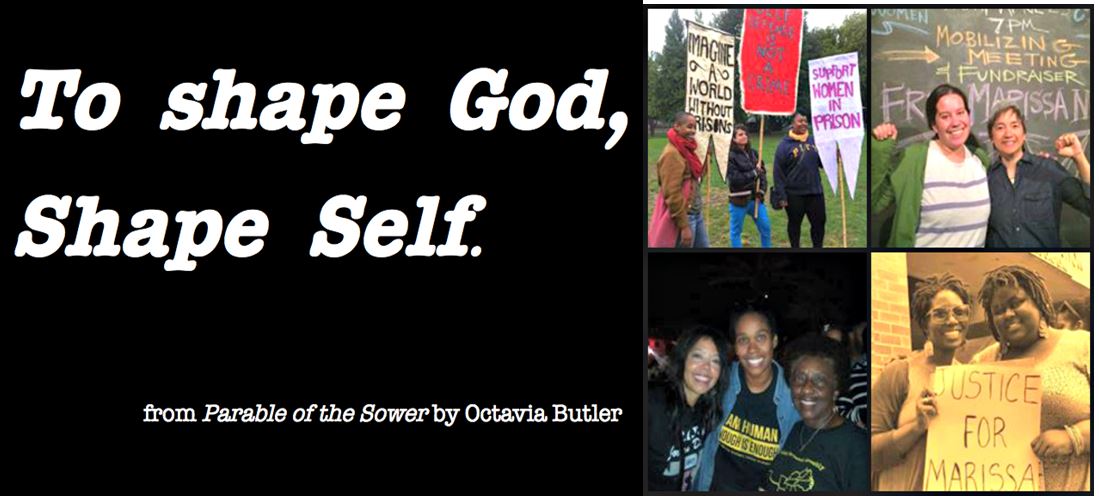
8/8/18: An Invitation to Make History
Parable of the Sower Intentional Community is taking applications for
allies to support their movement and learn about the principles of
intentional community by living it during their groundbreaking Land
Corps pilot project, which will take place in Jackson, Mississippi
during the month of August 2018.
Sign up here
to learn how you can support the first black women-led modern
intentional community in history with your time, or with donations of
land, money, and other forms of support.
About Aleta Alston-Touré:
Aleta Alston-Toure’ is a bi-coastal homeschooling mother, liberation strategist, and cooperative member of the Parable of the Sower Intentional Community Cooperative. Aleta bears witness as a vessel for social change through community organizing, political education and liberatory arts. Her energies through the strategic movement building organization, New Jim Crow Movement/ Southern Movement Alliance empowers mothers of color and their children, the incarcerated and formerly incarcerated, community members, and students. Free Marissa Now (FMN) is one of her major project success stories raising $100,000 through 37,000 members of their national organizing work that freed Marissa Alexander from a 60 year Stand Your Ground imprisonment. Aleta uses the methodology of popular education and liberation education, Universidad Sin Fronteras/University Without Walls and Freedom Schools. She also teaches on the African Diaspora through six languages using dance, song and healing techniques in community development.
Through her visionary grassroots leadership she was able to create the slogan “I am Troy Davis.” She is a soldier in the Black Liberation movement to remind all of the struggles for Mumia, Leonard Peltier, and other Political Prisoners and Prisoners of War. She has worked on six Blackside Documentary Films including the Emmy award winning, Eyes On The Prize documentary film (WGBH/PBS-TV.) She was also a Ford Fellow in the Massachusetts Institute of Technology (MIT) Urban Studies and Planning Community Fellows Program. Aleta strives to unite the present black liberation movement and women circles by focusing on collective strategic community solutions and the people’s movement assembly processes fighting patriarchy, and other isms. She will be for now doing her part as a cooperative member of Parable of the Sower Intentional Community Cooperative. For further information, please go to www.southtosouth.org
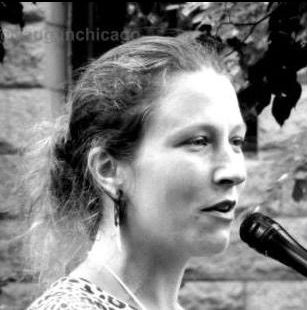 About the interviewer:
About the interviewer:
Kate Duva, aka Kate O’Rourke, is a novelist, performer and poet, as well as a mama, developmental therapist and intergenerational community educator who uses dialogue, popular education, and creative arts to bring together society’s unsung peacemakers to pool their collective wisdom and power. She is a certified Caring Economy Advocate and an organizer working at intersections of caregiver justice, education justice, racial and gender justice in Chicago and beyond. Her writing has appeared in numerous publications, most recently on the MomsRising blog for her essay Domestic Workers Save Lives. Reach her at kate@prosocialpower.org, or check out www.prosocialpower.org.
Further reading:
- Parable of the Sower Intentional Community Coop
- Free Marissa Now
- The New Jim Crow Movement
- Project South: Eliminating Poverty and Genocide
- People’s Movement Assembly (including organizing how-tos)
- Cooperation Jackson
- The New Economy Coalition
- The Fellowship for Intentional Community
- Africa’s Poorest Women Can Teach Us How to Manage Our Money
- The Platform for The Movement for Black Lives
Leave a Reply
You must be logged in to post a comment.

